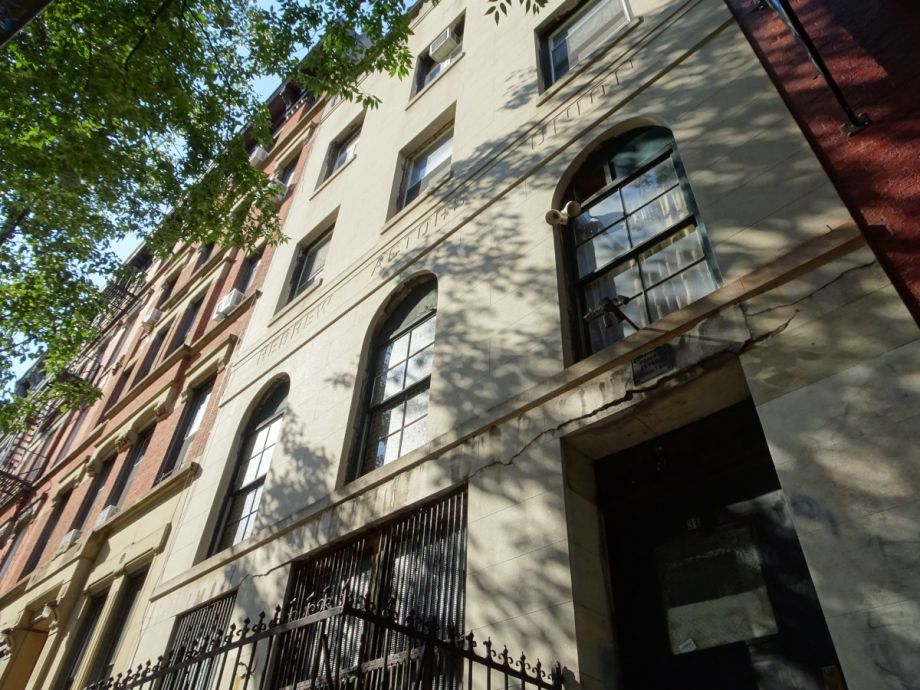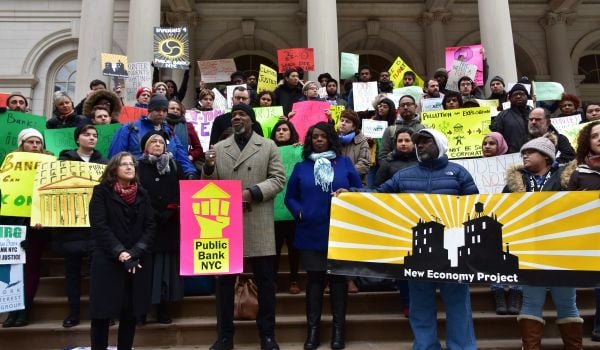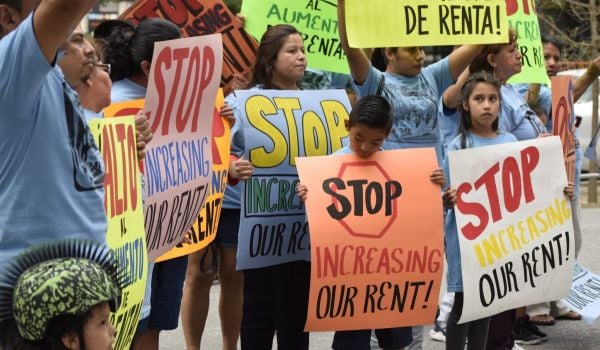The Hebrew Actors’ Union was the first performing arts union in the United States, founded in 1897. It lives on today, as the Hebrew Actors’ Foundation (HAF), continuing to support the Yiddish theater community. They’re currently planning to convert their historic headquarters, at 31 East 7th Street, into a museum and modern community theater. They own the building outright, and their original name is written in stone across the building facade. But that hasn’t stopped the city of New York from attempting to mistakenly sell the building out from under them.
“We were on the lien sale list for the last three years,” said HAF Co-president Hy Wolfe, at a rally last week on the steps of City Hall, organized by the Community Development Project of the Urban Justice Center and 596 Acres.
Wolfe spoke alongside Public Advocate Letitia James, and Council Members Antonio Reynoso and Ben Kallos in support of a new city council bill that would prevent nonprofit-owned property from getting caught up in the city’s annual tax lien sale, exposing nonprofits to unnecessary foreclosure and loss of their properties, and often bankruptcy.
For many nonprofits, it was too late: The tax lien sale was Friday, and an estimated 176 nonprofit-owned properties were still in the sale. HAF’s building was one that was successfully pulled out prior. If Reynoso’s bill passes, it would eliminate the annual scramble to get nonprofit-owned properties out of the tax lien sale.
Every year, the city of New York sells debt from severely delinquent property, water and sewer taxes. Private investors buy the debt from the city, and typically initiate a foreclosure to settle the debt; for cash-strapped nonprofits, foreclosure is essentially the only option if they get put into that position. But nonprofit organizations are technically exempt from paying city taxes. It wasn’t an issue until a change in 2012 that requires nonprofits to renew their city tax exemptions on an annual basis. The change led to many nonprofits suddenly getting bills and piling up debt they’ve never had to worry about before.
“There are many reasons why organizations might have paperwork issues,” Reynoso said at the rally last week. “We know they were not-for-profits five years ago, 10 years ago, 30 years ago. They’ve always been not-for-profits.”
This year was the first time that the city released a list of nonprofit-owned property caught up in the sale. Many are houses of worship.
“We are losing houses of faith all over New York,” said James. “Not-for-profit organizations serve as the heart of our communities. I’ve even seen senior citizens’ centers caught up in this debacle. To lose these organizations would be devastating for our communities.”
Reynoso’s bill would exempt from the tax lien sale any property owned by a nonprofit organization in the previous five fiscal years. Additionally, the bill would provide an exemption for any property for which the owner has submitted a pending initial or renewal application for a not-for-profit property tax exemption, as well as any property for which the owner is appealing the denial of such an exemption.
“Selling the tax lien means the rich will continue to get rich, the city will lose its churches, charities, open spaces and affordable housing,” added James. “By passing this legislation we’ll be making a statement that New Yorkers choose culture and community organizations over corporations.”
James also introduced another bill earlier this year that would begin the process of establishing a preservation trust, which would purchase tax liens on residential properties for the purpose of preserving or creating affordable housing at such properties.
“I’ll be honest, we’ve got $85.2 billion, we don’t need to be selling 5,000 liens,” added Kallos, who vice chairs the Council’s Progressive Caucus.

Oscar is Next City's senior economic justice correspondent. He previously served as Next City’s editor from 2018-2019, and was a Next City Equitable Cities Fellow from 2015-2016. Since 2011, Oscar has covered community development finance, community banking, impact investing, economic development, housing and more for media outlets such as Shelterforce, B Magazine, Impact Alpha and Fast Company.
Follow Oscar .(JavaScript must be enabled to view this email address)
















